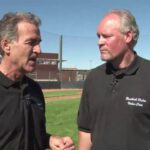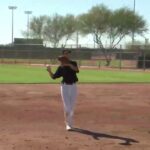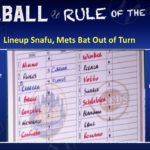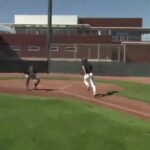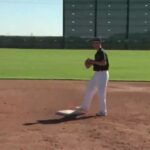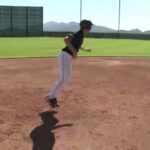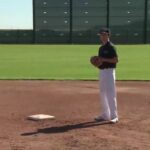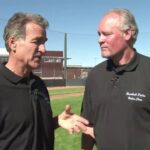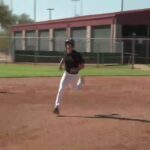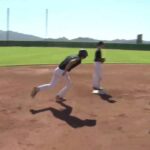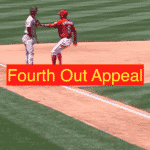7.10 Appeal
Any runner shall be called out, on appeal, when –
(a) after a fly ball is caught, the runner fails to retouch the base before said runner or the base is tagged (NOTE: “Retouch” in this rule, means to tag up and start from a contact with the base after the ball is caught. A runner is not permitted to take a flying start from a position in back of, and not touching, the base);
(b) with the ball in play, while advancing or returning to a base, the runner fails to touch each base in order before said runner, or a missed base, is tagged;
A.R.—(1) No runner may return to touch a missed base after a following runner has scored. (2) When the ball is dead, no runner may return to touch a missed base or one abandoned after said runner has advanced to and touched a base beyond the missed base.
Play A – Batter hits the ball out of the park, or hits a ground rule double, and misses first base (ball is dead). The runner may return to first base to correct the mistake before touching second. But if the runner touches second, he/ she may not return to first and if the defensive team appeals, the runner is declared out at first. (Appeal play.)
Play B – Batter hits a ground ball to shortstop, who throws wild into the stands (ball is dead). Batter-runner misses first base but is awarded second base on the overthrow. Even though the umpire has awarded the runner second base on the overthrow, the runner must touch first base before proceeding to second base. (Appeal play.)
(c) the runner overruns or overslides first base and fails to return to the base immediately, and said runner or the base is tagged;
(d) the runner fails to touch home base and makes no attempt to return to that base, and home base is tagged. NOTE: A runner forfeits his/ her opportunity to return to home base when he/ she enters the dugout or other dead ball area.
Any appeal under this rule must be made before the next pitch, or any play or attempted play. No appeal can be made if the ball is dead. If the violation occurs during a play which ends a half-inning, the appeal must be made before all the defensive players have left fair territory on their way to the bench or dugout. EXCEPTION: If an otherwise proper appeal is being made by a player who has to go into foul territory to retrieve the ball in order to make an appeal or if the appeal is being made by the catcher (who may never have been in fair territory at all), the appeal will be adjudged to have been properly executed.
An appeal is not to be interpreted as a play or an attempted play.
Successive appeals may not be made on a runner at the same base. If the defensive team on its first appeal errs, a request for a second appeal on the same runner at the same base shall not be allowed by the umpire. (Intended meaning of the word “err” is that the defensive team in making an appeal threw the ball out of play. For example, if the pitcher threw to first base to appeal and threw the ball into the stands, no second appeal would be allowed.)
NOTE 1: Appeal plays may require an umpire to recognize an apparent “fourth out.” If the third out is made during a play in which an appeal play is sustained on another runner, the appeal play decision takes precedence in determining the out. If there is more than one appeal during a play that ends a half-inning, the defense may elect to take the out that gives it the advantage. For the purposes of this rule, the defensive team has “left the field” when all players have left fair territory on their way to the bench or dugout.
NOTE 2: If a pitcher makes an illegal pitch when making an appeal, such act shall be a play. An appeal should be clearly intended as an appeal, either by a verbal request by the player or an act that unmistakably indicates an appeal to the umpire. A player, inadvertently stepping on the base with a ball in hand, would not constitute an appeal. The ball must be live and in play.

